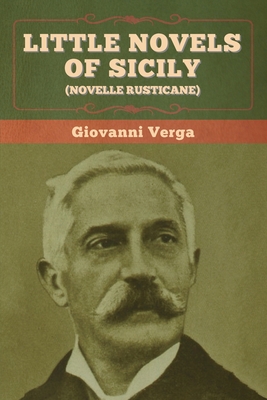Little Novels of Sicily (Novelle Rusticane)

Little Novels of Sicily (Novelle Rusticane)
Giovanni Carmelo Verga (2 September 1840 - 27 January 1922) was a Sicilian realist (verista) writer, best known for his depictions of life in his native Sicily, especially the short story (and later play) Cavalleria rusticana [it] and the novel I Malavoglia (The House by the Medlar Tree).
The first son of Giovanni Battista Catalano Verga and Caterina Di Mauro, Verga was born into a prosperous family of Catania in Sicily. He began writing in his teens, producing the largely unpublished, but currently quite famous, historical novel Amore e Patria (Love and Country); then, although nominally studying law at the University of Catania, he used money his father had given him to publish his I carbonari della montagna (The Carbonari of the Mountain) in 1861 and 1862. This was followed by Sulle lagune (On the Lagoons) in 1863.
He moved to Milan in 1872, where he developed his new approach, characterized by the use of dialogue to develop character, which resulted in his most significant works. In 1880 his story collection Vita dei campi (Life in the Fields), including "Fantasticheria" ("Daydreaming"), "La lupa" ("The She-wolf"), "Jeli il pastore" ("Jeli the Shepherd"), "Pentolaccia" ("The Plaything"), and Rosso Malpelo, most of which were about rural Sicily, came out. It also included "Cavalleria rusticana" ("Rustic Chivalry"), which he adapted for the theatre and later formed the basis for several opera librettos including Mascagni's Cavalleria rusticana and Gastaldon's Mala Pasqua!. Verga's short story, "Malaria", was one of the first literary depictions of the disease malaria.
He then embarked on a projected series of five novels, but only completed two, I Malavoglia and Mastro-don Gesualdo (1889), the second of which was the last major work of his literary career. Both are widely recognized as masterpieces.
In 1894 Verga moved back to Catania, to the house in which he had lived as a child. In 1920 he was appointed Senator of the Kingdom (Senatore del Regno) for life (ad vitam). He died of a cerebral thrombosis in 1922. (wikipedia.org)
PRP: 127.13 Lei
Acesta este Prețul Recomandat de Producător. Prețul de vânzare al produsului este afișat mai jos.
101.70Lei
101.70Lei
127.13 LeiIndisponibil
Descrierea produsului
Giovanni Carmelo Verga (2 September 1840 - 27 January 1922) was a Sicilian realist (verista) writer, best known for his depictions of life in his native Sicily, especially the short story (and later play) Cavalleria rusticana [it] and the novel I Malavoglia (The House by the Medlar Tree).
The first son of Giovanni Battista Catalano Verga and Caterina Di Mauro, Verga was born into a prosperous family of Catania in Sicily. He began writing in his teens, producing the largely unpublished, but currently quite famous, historical novel Amore e Patria (Love and Country); then, although nominally studying law at the University of Catania, he used money his father had given him to publish his I carbonari della montagna (The Carbonari of the Mountain) in 1861 and 1862. This was followed by Sulle lagune (On the Lagoons) in 1863.
He moved to Milan in 1872, where he developed his new approach, characterized by the use of dialogue to develop character, which resulted in his most significant works. In 1880 his story collection Vita dei campi (Life in the Fields), including "Fantasticheria" ("Daydreaming"), "La lupa" ("The She-wolf"), "Jeli il pastore" ("Jeli the Shepherd"), "Pentolaccia" ("The Plaything"), and Rosso Malpelo, most of which were about rural Sicily, came out. It also included "Cavalleria rusticana" ("Rustic Chivalry"), which he adapted for the theatre and later formed the basis for several opera librettos including Mascagni's Cavalleria rusticana and Gastaldon's Mala Pasqua!. Verga's short story, "Malaria", was one of the first literary depictions of the disease malaria.
He then embarked on a projected series of five novels, but only completed two, I Malavoglia and Mastro-don Gesualdo (1889), the second of which was the last major work of his literary career. Both are widely recognized as masterpieces.
In 1894 Verga moved back to Catania, to the house in which he had lived as a child. In 1920 he was appointed Senator of the Kingdom (Senatore del Regno) for life (ad vitam). He died of a cerebral thrombosis in 1922. (wikipedia.org)
Detaliile produsului










